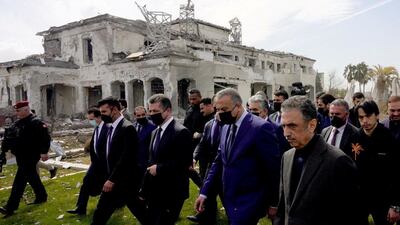Iraq came under attack on Sunday, after Iranian rockets hit a US consulate complex that was under construction in Erbil, the Kurdistan region of Iraq's capital. It is a significant, destabilising moment for the entire country, and one to which governments around the world should pay attention. Iraqi President Barham Salih is right to call it an act of terror.
Iranian responsibility for attacks in any part of Iraq – there have been many – should be condemned. But one in the KRG raises specific issues. The semi-autonomous area is viewed by many as a rare area of security and opportunity in post-invasion Iraq, not just for its significant oil revenues, but also for its diverse economy, in which many foreign businesses and NGOs find a safe and stable home, despite occasional protests against internal woes. Many of those who fled ISIS found safe haven in the Kurdistan region. But that safety is under direct attack by Iran.
The US has offered to boost the KRG's missile defence systems, which is a welcome gesture. But it is contradictory in the wider context of the Biden administration's overall Middle East policy, which is vastly focused on securing a new nuclear deal with Iran despite longstanding American allies in the Middle East for years warning against one. Their case rests on highlighting the narrowness of the US focus on the international threat of a nuclear-armed Iran, which does not take into account the specific threat Tehran poses only to its neighbours, particularly with its ballistic missiles programme and vast network of violent regional militias.
Even at the best of times, Iran has shown its willingness to sow chaos and destabilise the region specifically. But today, a surge in Iran-linked attacks can be viewed not as an expression of strength but as one of mounting weakness.
In neighbouring Iraq, Iran's extensive political network performed badly during recent elections. The KRG's political voice is an important one in Baghdad's government, and Sunday's strike is likely to serve as a reminder to the area's leaders that while Iranian political influence might be diminished, its military capabilities can still inflict serious, perhaps even existential damage to the KRG if it acts against Iranian interests. That Tehran has openly claimed responsibility for the strike – it normally hides behind militias – underlines this point.
Beyond Iraq, the attack is also Iran trying to grab attention as the world focuses on the Ukraine crisis. New Russian demands for guarantees on sanction-free trade with Tehran in a potential deal are almost certainly unacceptable for the US and its allies, making the agreement that Iran so desperately needs suddenly unlikely.
Iran still has the ability to influence developments in the region. Unfortunately, that influence is based not on diplomacy and trade, but through an embedded network of militias and an unacceptable willingness to destabilise as a weapon to achieve its dangerous regional agenda. By doing so, it is conversely making the most effective case against a new nuclear deal based on current, narrow lines. The latest salvo of attacks are a dangerous reminder of the complexity of the threat Tehran poses to the region, which goes far beyond the nuclear issue. It is also yet another vindication of the case being made by many Arab states for so long.










